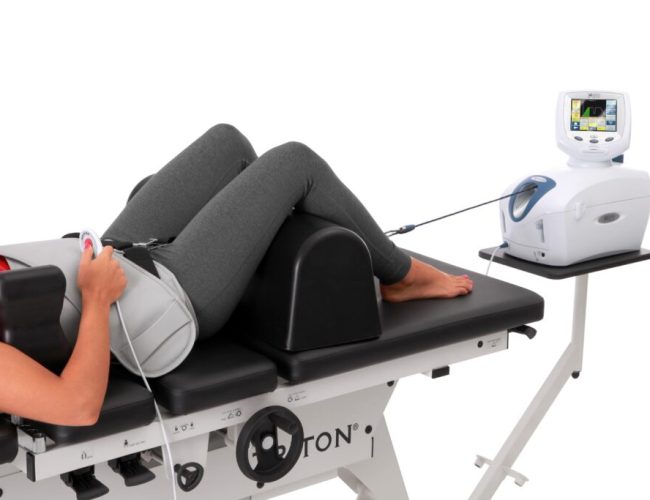Nonsurgical Spinal Decompression at Dublin 2 Chiropractic
We are pleased to provide Spinal Decompression with the Triton decompression system by Chattanooga®. With more than 70 years of experience in the service of clinicians worldwide, Chattanooga® has provided us with its next generation spinal decompression treatment systems, the triton DTS. We are very pleased to provide this highly regarded treatment option for our patients in the heart of Dublin city.
How Does Non-Surgical Spinal Decompression Work?
Nonsurgical spinal decompression is a type of motorised traction that can help relieve back and neck pain, sciatic and arm pain. Spinal decompression works by gently stretching areas of the spine. This stretching takes pressure off the spinal discs, which are gel-like cushions between the bones in your spine, by creating negative pressure in the disc. As a result, bulging or herniated disks may retract, taking pressure off nerves and other structures in your spine. This in turn, helps promote movement of water, oxygen, and nutrient-rich fluids into the disks so they can heal. Spinal decompression treatment has very high success rates for bulging disc symptom relief. Sessions on average can last 10-15 minutes and my take 12 to 24 treatments for disc bulging.
If you are suffering from chronic back pain or sciatica caused by conditions such as herniated discs, degenerative disc disease, or spinal stenosis, non-surgical spinal decompression may be the solution you have been searching for.
Benefits of Non-Surgical Spinal Decompression
- Relieves chronic back pain
- Reduces inflammation and promotes healing
- Improves mobility and flexibility
- Non-invasive and drug-free treatment option
- Helps avoid the need for surgery
How Does Non-Surgical Spinal Decompression Work? During a non-surgical spinal decompression session, you will lie comfortably on a specialized table that is equipped with advanced technology to gently stretch and decompress the spine. The treatment is painless and typically lasts for 20 minutes. Most patients experience significant pain relief after just a few sessions, with full benefits achieved after a series of treatments.
Is Non-Surgical Spinal Decompression Right for You? If you have been struggling with chronic back pain and are looking for a non-invasive and drug-free treatment option, non-surgical spinal decompression may be the right choice for you. This therapy is safe for patients of all ages and can be customized to meet your specific needs and conditions.


Contraindications for spinal decompression are:
- Fracture
- Tumor
- Abdominal aortic aneurysm
- Advanced osteoporosis
- Metal implants in the spine
- Pregnancy
How can I book?
New patients should book as a ‘New Patient’ through the online booking. A case history and physical exam must be preformed to determine if you qualify for this treatment modality. Please bring any MRI imaging and reports you might have. If possible please email a link to your images and a copy of your MRI report a day prior to the consultation.
If your condition is suitable for decompression we can give you an estimated time frame for recovery, in most cases we will recommend a frequency of 3 times per week for 4-8 weeks.
How Much Does it Cost?
Please see our fees for more information.
Contact us today If you are interested in learning more about non-surgical spinal decompression and how it can help you find relief from back pain. Our team of experienced professionals are here to answer your questions and help you on your journey to a pain-free life.

